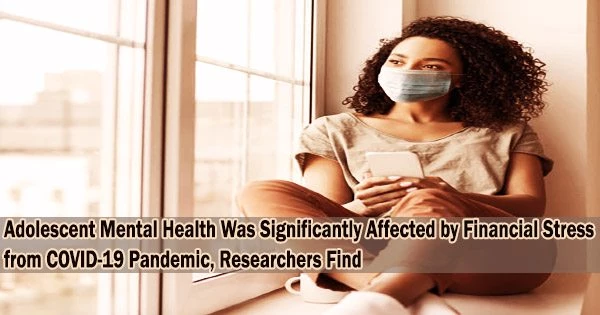According to a recent study by experts at Children’s Hospital of Philadelphia (CHOP), financial stress brought on by the COVID-19 epidemic had a noticeable impact on teenage mental health and related to depressive symptoms.
The effect was most obvious in low-income teens, according to the study, which was published today in The Lancet Regional Health Americas, but it also had an impact on all income groups because of the financial burden caused by a loss of income.
“People often think children do not feel or understand financial stress, but this study shows not only that they do, but that this stress also takes a toll on their mental health,” said senior author Ran Barzilay, MD, PhD, child psychiatrist and an assistant professor at the Lifespan Brain Institute (LiBI) of Children’s Hospital of Philadelphia (CHOP) and the Perelman School of Medicine at the University of Pennsylvania.
“Given the strain inflation is likely placing on families’ finances, our findings underscore that financial stress is a key risk factor for adolescent mental health during economic crises and that addressing this stress is important given the current global youth mental health crisis.”
The COVID-19 pandemic has had a significant influence on global public health, but it has also played a role in the current global economic crisis, which has both made many people’s existing financial problems worse and put many more in a new position of financial hardship.
An link between income loss brought on by the pandemic and financial stress and depressed symptoms in people has been demonstrated in earlier study at CHOP and LiBI. There was, however, little information on the effects of financial stress on teenage mental health in the past despite an ongoing global epidemic in juvenile mental health.
Although this research focused specifically on pandemic-related wage loss, we suspect financial strain is a broader mental health risk factor for children and adolescents that is relevant during any time of economic uncertainty. Future studies should look at targeting youth’s financial stress and family conflict to ease the mental health impact of difficult financial circumstances.
Dr. Ran Barzilay
To better understand this relationship, the CHOP researchers analyzed data from 9,720 adolescents who were a part of the Adolescent Brain Cognitive Development Study (ABCD Study®), a diverse sample of more than 10,000 U.S. children between the ages of 11 and 14.
Between May 2020 and May 2021, the researchers specifically looked at the relationship between financial stress and teenage mental health. Pre-pandemic data on household income and mental health were available for all participants.
The study’s findings showed that teens whose families suffered salary losses as a result of the pandemic were more likely to be Black (19.5% vs. 12.2%), Hispanic (22.0% vs. 12.9%), and living in poverty (15.2% vs. 4.2%) than those whose families did not. These demographics also revealed higher degrees of anxiety regarding the pandemic’s financial effects.
Youth with lower pre-pandemic household income were more likely to experience financial stress and salary loss due to the pandemic; in other words, the poor were more likely to become poorer, which had a bigger detrimental effect on mental health.
Youth from families that lost wages reported higher depressed symptoms than youth from households who did not lose wages, regardless of pre-pandemic income, and they also reported feeling more perceived stress. Even after controlling for mental health prior to the pandemic, there was a strong correlation between financial stress and depressive symptoms.
The researchers sought to establish a link between financial stress and depressed symptoms as well as to better understand the mechanisms through which lost wages affect the mental health of adolescents.
In order to do this, they looked at longitudinal data to find variables that mediated the transition from juvenile depressed symptoms at the start of the pandemic to household wage loss at the end of the epidemic. They discovered that family strife and the youth’s subjective financial stress both contributed to poor adolescent mental health, indicating that financial hardship affects kids and teenagers via a complicated web of indirect channels.
“Although this research focused specifically on pandemic-related wage loss, we suspect financial strain is a broader mental health risk factor for children and adolescents that is relevant during any time of economic uncertainty,” Dr. Barzilay said. “Future studies should look at targeting youth’s financial stress and family conflict to ease the mental health impact of difficult financial circumstances.”
















